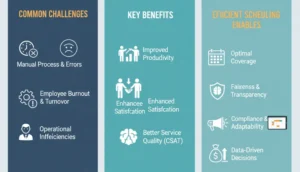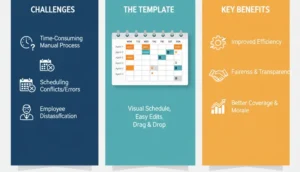A Guide to Work Management Tools
A guide to work management tools boosts contact center efficiency, highlighting task management, workflows, and collaboration for superior performance.
5 min read
The number of work management tools is growing rapidly, offering several options for businesses looking to boost productivity and streamline their operations.
Contact centers and BPOs can significantly benefit from these tools by organizing tasks, managing workflows, and coordinating between teams. With the increasing demand for efficiency and the need for higher customer satisfaction, it is crucial to understand how work management tools can transform the way contact centers function.
This guide will dive into the various aspects of work management tools and their significance for contact centers and BPOs.
Work management tools are essential in improving communication, tracking performance, and reducing the chaos of managing a workforce. According to a recent study by McKinsey, companies that use these tools report a 20-25% increase in productivity. These tools help in the seamless allocation and execution of tasks, ensuring that everyone is on the same page and no work is left unattended.
Additionally, they provide real-time insights into operations, enabling managers to make informed decisions concerning resource allocation and process improvement. For contact centers, where the volume of tasks can be overwhelming, these tools can be a game-changer by optimizing their operational workflow.
The increasing demand for remote capabilities has further increased the need for robust work management tools. As reported by Gartner, 74% of organizations plan to permanently shift to remote work post-pandemic, which underscores the importance of having tools that can bridge the physical distance between team members. Work management software not only facilitates remote coordination but also maintains accountability, helping leaders track progress and ensure that performance metrics are met consistently.

Key Features of Work Management Tools
Work management tools come with features designed to streamline operations and enhance productivity. Understanding these features can help contact centers and BPOs select the right tools tailored to their specific needs.
1. Task Management
Effective task management is at the heart of any productive contact center. Work management tools offer comprehensive task management features, enabling users to create, assign, and track tasks effortlessly. This ensures that everyone knows their responsibilities and nothing falls through the cracks.
Pro Tip
Use color-coded labels to prioritize tasks efficiently and easily identify high-priority items at a glance.
2. Workflow Automation
Automation reduces manual intervention, saving time and minimizing errors. Workflow automation in work management tools allows contact centers to automate repetitive tasks, such as scheduling callbacks or sending follow-up emails, ensuring a smooth workflow.
Pro Tip
Map out your existing processes before automating them to identify bottlenecks and optimize workflows.
3. Time Tracking
Time tracking is crucial in understanding how resources are spent. It helps contact centers allocate their manpower more effectively and improves accountability. Many work management tools provide built-in time tracking features that integrate with payroll systems.
Pro Tip
Encourage agents to review their time logs regularly to understand their productivity patterns and make necessary adjustments.
4. Collaboration Features
For contact centers that operate on a large scale, collaboration features are vital. Work management tools offer a centralized platform where team members can communicate, share files, and collaborate on projects efficiently, which enhances teamwork and boosts morale.
Pro Tip
Regularly organize virtual team-building exercises using these collaboration tools to build rapport among remote team members.
5. Reporting and Analytics
Detailed reports and analytics can provide valuable insights into the performance and efficiency of operations. Work management tools offer customizable reports that help managers make data-driven decisions to improve service quality and productivity.
Pro Tip
Set up automated reports that get emailed to stakeholders regularly to keep everyone informed about the team's performance.
Choosing the Right Work Management Tool for Your Call Center
With so many work management tools available, selecting the right one can be daunting. Here are some key considerations to help you make an informed decision.
1. Assess Your Needs
Before choosing a tool, evaluate the specific needs of your contact center. Identify areas that require improvement, such as task allocation, communication, or reporting. This will guide your decision and ensure that the selected tool addresses your pain points.
Pro Tip
Conduct surveys or interviews with your team to understand their challenges and preferences before shortlisting potential tools.
2. Compare Different Tools
Research and compare different work management tools. Look at their features, pricing, ease of use, and scalability. Tools like HiveDesk offer unique features tailored for contact centers, but a comparative analysis will help you find the best fit.
Pro Tip
Take advantage of free trials or demos offered by software providers to get a hands-on feel for the tool's functionality and user interface.
3. Consider Integration Capabilities
Check if the tool integrates with existing systems, such as CRM or communication platforms, to ensure seamless operations and data synchronization across different platforms.
Pro Tip
List down all essential tools and software you currently use and prioritize tools that offer maximum integration options to avoid system silos.
4. Evaluate User Experience
A work management tool’s design and ease of use can significantly impact its adoption. Ensure that the tool is intuitive and user-friendly, making it easy for agents and managers to navigate and perform tasks.
Pro Tip
Gather user feedback during the initial phases of tool adoption to identify any user interface issues and address them promptly.
5. Scalability
As your contact center grows, so should the capabilities of your work management tool. Select a tool that supports scaling without losing efficiency or performance.
Pro Tip
Choose a tool with flexible pricing plans that allows you to add or remove features as your team evolves, ensuring you only pay for what you need.
Implementing Work Management Tools in Your Call Center
Effective implementation of work management tools can set the foundation for a successful transformation. Here’s how you can ensure a seamless transition.
1. Train Your Team
Comprehensive training is vital for successful implementation. Provide your team with the necessary resources and training sessions to familiarize them with the new tool’s features and functionalities.
Pro Tip
Create an internal knowledge base or FAQs that team members can refer to for ongoing support and troubleshooting.
2. Monitor Progress
Keep track of how well the tool is being adopted by monitoring usage statistics and collecting feedback. This will help you identify any gaps and provide additional training or support where needed.
Pro Tip
Use feedback to make iterative improvements to the process and adopt new features as they are released to ensure optimal tool usage.
3. Encourage Feedback
Open communication is crucial. Encourage team members to share their experiences and challenges with the new tool to help you refine its usage and improve satisfaction.
Pro Tip
Set up a feedback loop where employees can submit feedback anonymously to get honest insights and foster a culture of continuous improvement.
Conclusion
The guide to work management tools emphasizes the significant benefits they offer contact centers and BPOs in terms of efficiency, productivity, and communication. These tools are not just about managing tasks but are pivotal in streamlining operations, facilitating remote work, and fostering collaboration in an increasingly globalized world. Selecting and implementing the right tool requires careful consideration of various factors, from feature sets and integration capabilities to scalability and user experience. By leveraging work management tools, contact centers can achieve operational excellence and set themselves apart in a competitive market.
FAQ
1. What are work management tools?
Work management tools facilitate organizing, tracking, and automating various tasks and projects to optimize productivity and workflow.
2. Why are work management tools important for contact centers?
They help streamline operations, improve task management, enhance communication, and ultimately lead to higher customer satisfaction.
3. Can work management tools improve productivity?
Yes, they can significantly enhance productivity by organizing tasks, simplifying workflow, and allowing real-time tracking of performance.
4. What features should I look for in a work management tool for BPOs?
Key features include task management, workflow automation, time tracking, collaboration tools, and reporting and analytics.
5. How do work management tools support remote work?
They provide platforms for collaboration, task tracking, and communication, essential for coordinating remote teams efficiently.
6. Are work management tools scalable?
Most work management tools offer scalable solutions to accommodate the growing needs of a business, with flexible pricing plans to match.
7. What integration capabilities should I consider?
Ensure the tool integrates with existing CRMs, communication platforms, and other essential software used within your contact center.
8. How do I assess which work management tool is best for my contact center?
Assess your specific needs, compare different tools, consider integration capabilities, and evaluate user experience and scalability.
9. How can I ensure successful implementation of a work management tool?
Provide thorough training, monitor progress, and encourage feedback for continuous optimization and effective use of the tool.
10. What are some popular work management tools for contact centers?
Some popular tools include Monday.com, Trello, Asana, HiveDesk, and Wrike, each with unique features tailored for different needs.
Start your outsourcing company’s transformation today!
Say hello to productivity, accuracy, and profitable growth. Streamline your operations and project management with HiveDesk.



